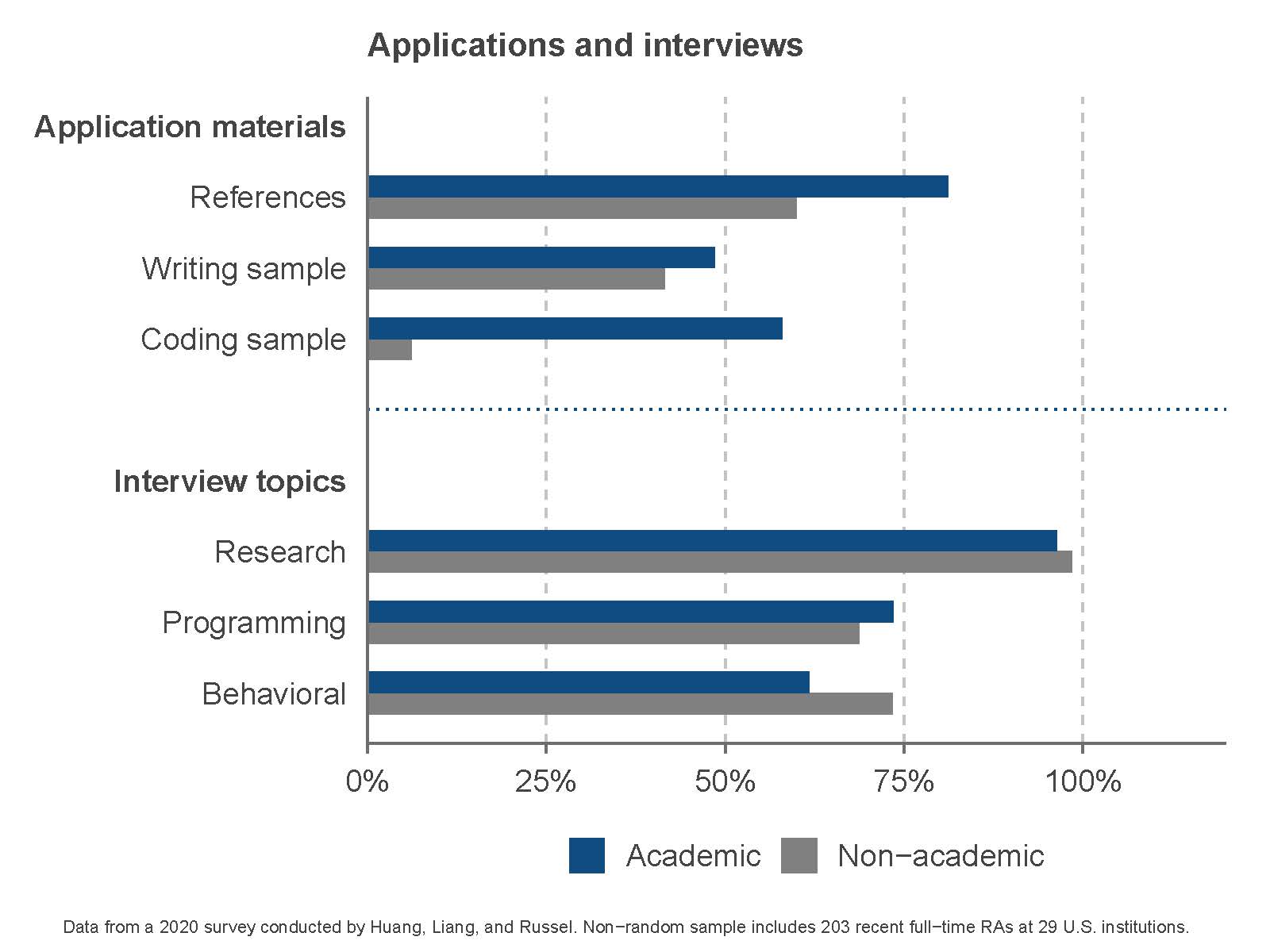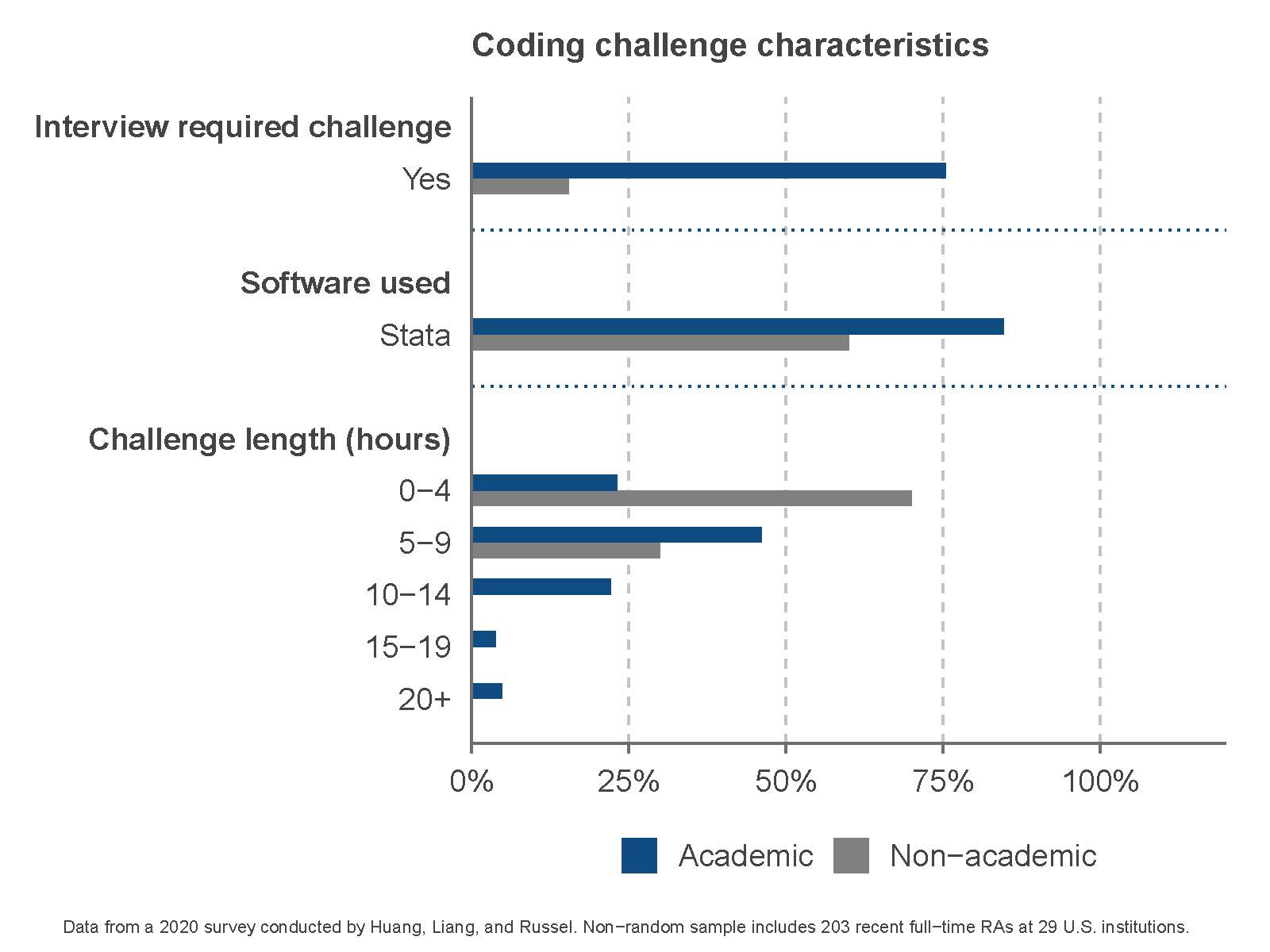Submitting applications
The actual application process consists of sending in your initial application materials, followed sometimes by interviews and/or a “coding task,” and then the eventual offer.

Initial application materials
Often, the application materials for the initial application will include things like:
- Transcript: Unofficial is fine!
- Resume: Include your most relevant jobs and research experience, but try to stick to no more than a page. Ask a friend or two to read this over for typos.
- Cover letter: Think of this as a short version of your “personal statement” you would submit if you were to apply to a PhD program. Use this space to highlight your particular strengths! This should not be a summary of your resume, but should provide details on the experiences, skills, and interests that demonstrate how motivated, creative, and capable you are.
- Writing sample: Try to pick a piece of your work that demonstrates both your research skills and your ability to write clearly, e.g. a course paper or a portion of your undergraduate/master’s thesis. In the interview stage (see below), you should be prepared to discuss and answer questions about the sample you submitted.
- Coding sample: Look for something that demonstrates that you have a good handle on programming principles, such as commenting, structure, etc. – even better if it also showcases your statistical abilities!
- Recommendations: You want to get letters of recommendation from people who can speak to your initiative, curiosity, and general aptitude for research. Professors and previous bosses work well. Reach out to your recommenders early so that they have plenty of time to write a good letter!
If you are applying for many positions - which may make sense for you since many positions require a similar set of materials - we recommend that you keep a spreadsheet to keep track of where you want to apply versus where you have applied, and what each application requires. This will help you stay organized as you go.
Coding task
If the application process includes a coding task, this will likely be the most time-consuming and stressful portion of the process. The purpose of coding tasks is to allow you to demonstrate your coding skills, your ability to problem solve, and your ability to communicate results clearly and accurately.
Coding tasks are either sent to all applicants or are sent after a first round of screening. You will be given a window of time in which to complete the task (e.g. 24 hours starting from a day of your choosing). There will be a lot of variance in how long you’re told to take with the task and how long it will actually take to complete. Some tasks can be done in a language of your choosing, while others may ask that you use a particular language. You will typically be given:
- a dataset or instructions on a dataset to download
- a description of a research question or topic of interest, and
- a set of empirical questions to answer.
Often there is some ambiguity in (2) and (3), which gives you the opportunity to make decisions and suggestions in your analysis. Tests are evaluated based on your coding ability, the decisions you make in the analysis, and how you report/communicate your results. These are all skills that will be very useful on the job.
The ideal task submission should have:
- Code that demonstrates good coding practices (e.g. helpful commenting, logical organization). See our appendix section on coding resources for examples of this.
- Code that indicates familiarity with using basic commands, and possibly knowledge of more advanced commands
- Neat, clearly labeled and well-formatted figures and tables, including footnotes (generated in your code rather than by hand if possible)
- A clear, concise write-up (ideally, written in LaTeX) explaining your results and analytical decisions. Try not to write pages and pages!
In short, the coding task will test you on skills that you may use day-to-day on the job. Take a look at our coding example for a chance to practice developing some of these skills.

Interview
Almost 100% of survey respondents reported that their job interviews were conducted by professors or senior researchers. Many also reported being interviewed by a grad student or a current RA. Whoever your interviewer, though, your goal is to persuade them that you (1) are smart, creative, and capable, (2) have an aptitude for research, and (3) are a nice, hard-working person who is easy to work with. Many PIs will also want to know whether you have a strong interest in doing economics research long-term (e.g. whether you want to go to graduate school).
Most likely, your interviewer may ask you for details about a project you have pursued or the writing sample you submitted, so have this in mind prior to the interview. Questions in this vein may relate to the motivation for your research, the methodology/identification strategy you chose and why, any limitations and how they could be addressed, and what lessons you learned from the project. Some interviewers may also ask you technical questions about the field that you’re applying to work in (e.g. intermediate micro theory if you’re applying for a job in microeconomics). They may also ask you to tell them about a paper you’ve recently read. It isn’t unheard of for senior researchers to send you something in advance (e.g. a paper they wrote) to discuss during the interview as well.
General best practices for interviews apply for RA interviews too. Be polite, dress professionally, and come in prepared with your own questions about the job.